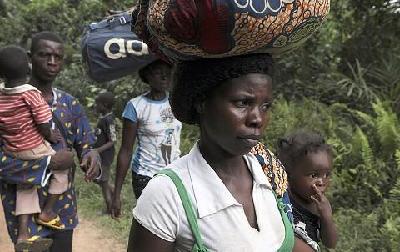Ivorian refugees who backed former president Laurent Gbagbo say the new government in Abidjan has not made it safe enough for them to return home. Amnesty International says Ivory Coast security forces are creating a climate of fear. As refugees in Liberia settle in for a longer stay, authorities are trying to move them into larger camps.

Nearly 6,000 Ivorians live in a camp near the Liberian town of Duogee. Most are from the Guéré ethnic group who backed former Ivorian President Laurent Gbagbo.
Crippling fear
Sixty-seven-year-old Zoignan Honore Kpehie says he and his family were chased from their home by fighters loyal to the current president Alassane Ouattara. He says they are too afraid to return because Ouattara forces remain in Guéré villages as part of the new national army.
Kpehie says the whole family was sick when they got to the camp. Now that they are here, he says, they do not know what to do. Kpehie says going back to Ivory Coast is a problem because the Ouattara rebels are still there, so their security is not guaranteed. Personally, he says, I am not ready to go back to Ivory Coast.
Ivorian English teacher Yves Beh Bah came to Liberia through Guinea. He says some ethnic Mandingo refugees who crossed the border farther north - and who generally back President Ouattara - are starting to return home. But Ivorians from southern provinces who voted for Gbagbo are staying put, he says, because it is not safe enough to go back.
"I am hunted, OK? I am hunted. They want to kill me. And for me I am not ready to go back to that Ivory Coast even if it causes me to spend more than 12 years to 15 years here. I think I will do that because there is no security in my country."
Relief effort
So relief groups at the Duogee camp are gearing up for a longer stay. Doctors Without Borders is building a new hospital. The UN refugee agency has shifted the camp's status from transitional to more-permanent, which means tents will be replaced by sturdier shelters of mud block, bamboo, and plastic sheeting.
Caritas organizes food distribution for refugee families, more than half of whom have only a mother in the camp. UNICEF is running primary school classes through the summer for Ivorian students who missed much of their academic year.
Most of the camp expansion will be in Grand Geddeh county with the two biggest camps at a former logging compound and here at Duogee.
Water shortage
Besides, 24 water taps and six boreholes will not be enough for the new arrivals. Drilling more takes time as the water table here is deep. James Chokpelleh manages the camp through the Norwegian Refugee Council.
"We have some difficulties in terms of water, so in terms of water supply we need more assistance to enable our refugee population to have adequate water provided for them."
This camp is expected to triple in size by the end of the year as authorities work to settle 80,000 refugees into larger camps. The plan predicts 30,000 Ivorians will remain in local villages and another 30,000 will go home.
Ivorians: 象牙海岸的土著居民
UNICEF: United Nations International Children's Emergency Fund 聯(lián)合國兒童基金會(huì)
World Refugee Day given urgency by Arab Spring
Former refugee dirties hands for clean project
U.N. says lack of money forces cuts in food aid for African refugees
There being no chastity in genital mutilation
(來源:VOA 編輯:實(shí)習(xí)生史莉萍)
